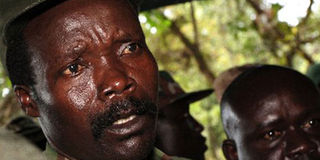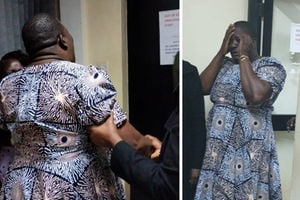Doubts cast over Kony’s surrender

A file picture taken on November 12, 2006 of the commander of the Lord's Resistance Army (LRA) Joseph Kony answering journalists' questions at Ri-Kwamba, in Southern Sudan. Kony, whom the US has placed a $5 million on his capture, is still on the ran. PHOTO | AFP
What you need to know:
- Mr Francisco Madeira, the African Union’s special envoy on the LRA, told the UN Security Council on November 20, that Central African Republic leaders were in touch with the Lord’s Resistance Army (LRA) rebel group and its overall commander Kony
- In the past, Mr Kony has told lies or walked back on his commitments to more credible intermediaries, even after persuaded national leaders and international actors bent backwards to accommodate his testy demands
- Djotodia remains unrecognised internationally as President or head-of-state eight months after taking power violently, and his authority to preside over the country has significantly been eroded by the recent spiral in violence across the country masterminded by unruly elements among his armed allies
- The UN, at the urging of France, CAR’s former colonial master, on Tuesday this week proposed to deploy a 7, 000-strong intervention force to stabilise the country teetering towards full-blown genocide fanned by inter-religious rivalry
KAMPALA
Was the world duped, even fooled, on the intended surrender by Joseph Kony, one of the most brutal and wanted warlords?
It seems apparently so, according to emerging details.
Mr Francisco Madeira, the African Union’s special envoy on the LRA, told the UN Security Council on November 20, that Central African Republic leaders were in touch with the Lord’s Resistance Army (LRA) rebel group and its overall commander Kony.
Mr Madeira based his briefing on updates received from CAR’s interim president Michel Djotodia during their interface in Bangui at the end of October.
According to various government and diplomatic sources, the LRA in the SOS message promised its fighters would have assembled by November 3 if guaranteed safe passage and supplies.
In other words, the prowling rebels already skipped their own deadline to gather in one place and it was 17 days after this wile that Mr Madeira notified the UN Security Council — vaulting over the uncomfortable detail that the development had been overtaken by reality on the ground.
A US Department of State official quoted by UK public broadcaster, the BBC, noted that Washington was not persuaded Kony was on the cusp of abdicating rebellion.
The US official was not alone, and no concrete information other than loose lines dropped by beleaguered CAR officials, has come to light to validate those serious claims of the intended surrender.
In the past, Mr Kony has told lies or walked back on his commitments to more credible intermediaries, even after persuaded national leaders and international actors bent backwards to accommodate his testy demands.
Paul Ronan, co-founder of Resolve, a frontline advocacy group on LRA issues, says the surrender talks claims “most likely aren’t true”.
The only confirmation so far is that CAR transitional President Djotodia, noted Mr Ronan, is in contact with an LRA group, just not Kony’s.
Multiple sources have told this newspaper that Otto Laderere, known to be Kony’s former security aide who replaced Caesar Acellam as LRA’s Intelligence chief, in late August made contact with one Demane; a general in President Djotodia’s Seleka group that ousted President François Bozizé Yangouvonda in March, this year.
Mr Laderere’s group is hibernating in Nzako in CAR’s remote but mineral-rich south-east, where the rebels and their dependants reportedly also practice subsistence agriculture.
DESTRUCTION OF LRA CAMPS
The AU Regional Taskforce, as the regional intervention force supported by about 100 US Special Forces is called, has over the past months destroyed LRA camps and denied the rebels a permanent lair.
Unable to roam freely and pillage villagers to replenish dwindling supplies, the rebels have once again picked from their bag of tricks the most-tempting sweetener: An offer to renounce rebellion in exchange for a safe haven and food.
The rebels during their initial contact in August put their number together with dependants at 1, 200.
They then increased it to 2, 000 and later doubled it to between 4, 000-5, 000 when they got feelers of possible deliveries, an exaggeration calculated to attract bigger quantities of food and medical supplies.
Yet independent estimates show LRA’s fighting force is no more than 600, the rank and file being depleted by deaths and a spate of defections encouraged by regional militaries through air-dropped leaflets.
This newspaper understands that Djotodia as well as non-governmental organisations, eager to have the credit of getting one of the world’s most wanted men out of the bush rub on them, hauled generous portions of food and medicines to the rebels before everything suddenly went silent again!
According to Resolve’s Ronan, the interim leadership separately forced villagers and civil society actors to deliver food to rebel hide-outs, often at great risk to their safety.
By October 31 when UN and AU envoys; Abou Moussa and Mr Madeira met and told CAR leaders not to deliver supplies to LRA without concrete action --- say release of children and women in captivity --- the rebel group under Laderere had already snapped up substantial rations, leaving the world to guess their next course of action.
UNRECOGNISED INTERNATIONALLY
Djotodia remains unrecognised internationally as President or head-of-state eight months after taking power violently, and his authority to preside over the country has significantly been eroded by the recent spiral in violence across the country masterminded by unruly elements among his armed allies.
The UN, at the urging of France, CAR’s former colonial master, on Tuesday this week proposed to deploy a 7, 000-strong intervention force to stabilise the country teetering towards full-blown genocide fanned by inter-religious rivalry.
A source at the heart of security matters in the Great Lakes Region says the Seleka rebels “systematically plundered” the wealth of the Catholic Church - one of the richest institutions in the landlocked country - during the war that brought Djotodia to power in March.
They ransacked missions, stripped removable property and commandeered four-wheel vehicles, including those owned NGOs, to the distaste of the faithful.
Because Muslims dominate the command, rank and file of Seleka running the struggling transitional government, the previous looting combined with ongoing bloody military operations targeting Bozizé loyalists has tended to be interpreted in religious hues.
Isolated internationally, and beleaguered at home, Djotodia is a desperate man willing to trade off anything except his life to gain credibility.
Stakeholders, including within the African Union, believe the struggling CAR leader tossed up the Kony surrender card to draw international attention and build a clout for recognition.
Others suggest both he and general Demane hoped to tap part or whole $5 million US bounty on the elusive LRA chief were he surrendered to them.
HOPE FLICKERS IN KONY HUNT
The Ugandan, Congolese, CAR and South Sudan have been hunting LRA rebels for months under the aegis of the African Union.
In October 2011, President Barack Obama assigned about 100 combat-equipped US Navy SEALS as field advisors to help regional armies remove Joseph Kony and other top LRA commanders from the battlefield.
UPDF’s Brig Sam Kavuma replaced Brig Dick Prit Olum as commander of the AU Regional Taskforce in July, around the same time Washington expanded its assistance previously to UPDF to cover other armies on LRA chase.
The American assistance includes sharing high-tech intelligence and gathering capabilities, training, and airlifting of troops as well as logistical supplies.
The 3085-strong Regional Taskforce is headquartered in Yambio, South Sudan, and has tactical bases in Central African Republic’s Obbo; Nzara, South Sudan; and, Ddungu in the Democratic Republic of Congo.
“The force is very robust; it has been destroying LRA camps; tracking those fleeing and denied them a permanent base to re-organise from,” said a senior African Union official who asked not to be named because they are not authorised to speak to the media.
“There is heightened pressure on LRA, and optimism on our part, that we are closer than ever before to achieve our ultimate objective: To eliminate the LRA.”
In mid-September, 2013, AU envoy Francisco Madeira secured diplomatic authorisation from a previously hesitant Kinshasa, allowing the Regional Taskforce (SPLA contingent) to co-hunt LRA rebels inside DRC territory alongside 500 FARDC troops who joined the operation only in February, this year.
THE UPDF has some 2, 000 troops on the mission, SPLA 500 adding to CAR’s 85.




